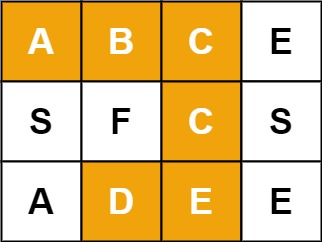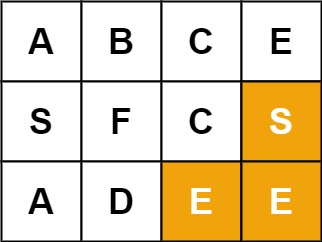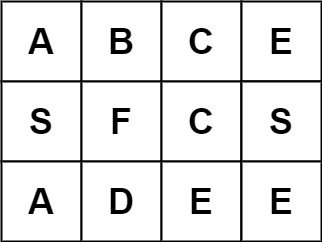動機
複習dfs
這次寫dfs的教訓
- 把會回傳true的放前面 (像是
[["a"]]),不然明明已經成功卻因為邊界檢查而失敗 - 把所有失敗條件放到base case中,在寫的時候不知道是頭撞到了還是怎樣,明明沒有比對到字卻還是讓dfs繼續跑…
Problem
Given an m x n grid of characters board and a string word, return true if word exists in the grid.
The word can be constructed from letters of sequentially adjacent cells, where adjacent cells are horizontally or vertically neighboring. The same letter cell may not be used more than once.
Example 1:

Input: board = [[A,B,C,E],[S,F,C,S],[A,D,E,E]], word = ABCCEDOutput: true
Example 2:

Input: board = [[A,B,C,E],[S,F,C,S],[A,D,E,E]], word = SEEOutput: true
Example 3:

Input: board = [[A,B,C,E],[S,F,C,S],[A,D,E,E]], word = ABCBOutput: false
Constraints:
m == board.lengthn = board[i].length1 <= m, n <= 61 <= word.length <= 15boardandwordconsists of only lowercase and uppercase English letters.
Follow up: Could you use search pruning to make your solution faster with a larger board?
Sol
class Solution:
def exist(self, board: List[List[str]], word: str) -> bool:
vis = [[False for _ in x] for x in board]
def dfs(w,k,i,j):
if len(w) == k:
return True
elif i < 0 or j < 0 or j >= len(board[0]) or i >= len(board) or vis[i][j] or board[i][j] != w[k]:
return False
else:
vis[i][j] = True
ret = any([dfs(w,k+1,i+1,j),dfs(w,k+1,i,j+1),dfs(w,k+1,i-1,j),dfs(w,k+1,i,j-1)])
vis[i][j] = False
return ret
for i in range(len(board)):
for j in range(len(board[0])):
if dfs(word,0,i,j):
return True
return False